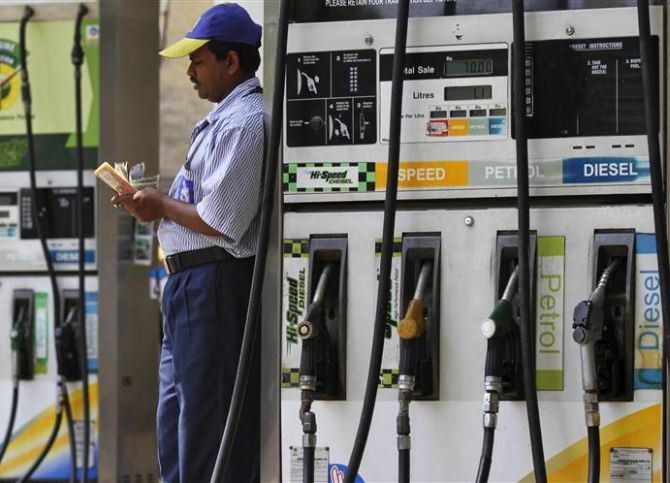 The oil and gas sector has a long list of demands from the maiden Budget of the Narendra Modi-led National Democratic Alliance government.
The oil and gas sector has a long list of demands from the maiden Budget of the Narendra Modi-led National Democratic Alliance government.
Oil and gas players’ wish list includes incentivising exploration and production (E&P) investments through clarity on taxes, reintroduction of income-tax holiday for exploration and production activities (which phased out in 2011), production-sharing contract reforms, shale gas policy, change in upstream cess and royalty; sops for development of city gas distribution sector and bringing gas under the goods and services tax.
“To attract investment into the sector and achieve uninterrupted growth, it is imperative for the new government to address some of the key tax issues, which are specific to the oil exploration and production industry and remain unaddressed till date,” said Raju Kumar, tax partner (oil and gas) at Ernst & Young.
Please click here for the Complete Coverage of Budget 2014 -15
Kumar said there needs to be clarity on the applicability of tax-holiday provisions on production of natural gas and flexibility to claim tax holiday by companies engaged in the commercial production or refining of mineral oil. There have been discussions on the potential change in the fiscal regime of the new exploration and licensing policy (Nelp) and a Cabinet Committee on Investment has been appointed for granting approvals for oil and gas blocks.
“These moves on the government's part suggest that the government is conscious of the need to provide the necessary impetus to this industry and is working towards it,” said Kumar.
Analysts say tax holiday for oil refining activities under section 80IB of the Income Tax Act, which phased out on March 31, 2011, could be re-introduced.
Plus, a provision could be made to deduct the expenditure incurred on the foreign blocks since more Indian oil and gas firms are going global and acquiring blocks abroad.
With effect from April 1, 2009, the seven-year tax holiday under section 80IB (9) is available only to blocks assigned in Nelp-VIII and coal bed methane round (CBM IV).
Earlier, this benefit was available to all blocks. Many firms had claimed this benefit before April 2009 for blocks other than that of Nelp-VIII and CBM IV.
“Our recommendation is, this benefit should be made available to all mineral oil and natural gas blocks to avoid the anomaly and the oil firm who had already received the benefit before above amendment," said L K Gupta, managing director and CEO of Essar Oil.
To undertake E&P activities, operators need to import various goods and accordingly, the list of exempt goods should be suitably amended to include all goods required for carrying out petroleum operations.
Currently, only specified goods imported for E&P operations are exempt from Customs duties.
In fuel retailing, the most important Budget wish is diesel deregulation, which, in addition to reducing the subsidy burden by a significant amount, will lead to a level-playing field between private and public oil marketing firms. “The notion of diesel price hike stoking inflation is unfounded.
If you take into account potato or onion prices, it won’t rise by more than 10 paise a kilogram (kg) even if diesel price is hiked by Rs 5 a litre at one go (assuming a 500 km farm-to-plate journey on a 10,000-kg capacity truck, the incremental cost per kg is actually only a few paise).
Other factors like hoarding, speculation, poor supply chain infrastructure, cartelisation, etc have far more influence on retail prices than diesel prices alone,” added Gupta of Essar Oil.
Players also wanted the excise duty on branded products to be made on par with unbranded products, encouraging sales and boosting energy efficiency.
While branded petrol is levied a basic excise duty of Rs 7.5 a litre, the same is Rs 1.2 a litre on unbranded petrol.
Similarly, branded diesel attracts a basic excise duty of Rs 3.75 a litre, while that of unbranded diesel is Rs 1.46 a litre.
Due to such huge price differences, sales of branded fuels have fallen to negligible levels.
In the downstream sector, the players want the entire pipeline network to be declared a national asset, brought under one firm and made available to all oil marketing firms at reasonable cost on open access basis.
This will help reduce the prices to the end customers.
Another demand is that the government formulate a policy framework for infrastructure-sharing amongst refinery companies where players are allowed to draw products from each other’s location at transfer price.
This will cut duplication in logistics movement, thus saving money for oil companies.
“Reduction/savings in logistic cost will get eventually passed on to the end consumers in a competitive environment,” said Gupta. Oil and gas players want the government to phase out central sales tax (CST), which stands at two per cent.
The industry also wants the government to reduce CST to nil which otherwise sometimes creates situations where domestic products become costlier than imports.
Please click here for the Complete Coverage of Budget 2014 -15












 © 2025
© 2025